- From Faith Current: “The Sacred Ordinary: St. Peter’s Church Hall” - May 1, 2023
- A brief (?) hiatus - April 22, 2023
- Something Happened - March 6, 2023
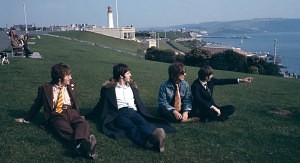
The Beatles relaxing during the filming of Magical Mystery Tour, 1967.
Oh my god, I enjoyed this documentary on “Magical Mystery Tour.” I think you will, too.
As I watched the clips, I was reminded of both The Running Jumping Standing Still Film and The Bed-Sitting Room, among other things. MMT uses the same homely vernacular you see in everything from Spike Milligan to The Pythons, and twists it in a lot of the same ways. While it’s old hat to compare MMT to Buñuel and the underground, it’s maybe fairer (and more interesting) to place it astride the meandering line of British humor as practiced post-Goons, pre-Comedy Store. After all, Neil Innes is in the goddamn thing, not Kenneth Anger.
To my American eyes it’s all so very English; English silliness, English grotesquerie, English wordplay, English subversion. (The doc mentions this last point, and I think it’s a good one.) Even the topless scene—there’s nothing American about that. Imagine such an interlude being in The Monkees’ HEAD. HEAD strains mightily to be 1/10th as interesting as MMT but fails because, surprise, all it’s really about is media culture. So American, so sterile, so utterly boring. Not their fault, but shit, c’mon, really? Here’s an idea: turn off the TV and go talk to Grandma. She’ll tell you stuff that actually happened.
I loved this documentary for the same reasons I love, oh, Ealing comedies, Jaffa cakes, the Morgan Threewheeler, to take a random core-sample of my brain at this very moment. British culture was so utterly different from what I experienced as as a child, and it gave me a feeling of such safety, such hope. From 1960-80 there was a happy collision—Americanized Englishness, or Anglicized Americanism—and each was improved. The British Invasion plus Brian Wilson equals Pet Sounds. Stanley Kubrick plus London equals…well, put it this way: Dr. Strangelove would’ve been very different if it had been filmed in Culver City. (If you’ve ever sat through The Loved One, you feel me.) That Mid-Atlantic stuff is still what gets me out of bed in the morning. It’s what I’m aiming for, always, and if I never quite make it, well, I’m just one guy. These 45 years are heavy.
Even tonight, I ached when the documentary was over, as if it were 1976 again, or 1982, or 1989—or 2012—and I was misunderstood and marooned again, back in this slick, loud, muscled-up, dumbed-down country with too many hand guns and insufficient appreciation for the virtues of traditional tailoring. God in His infinite wisdom has placed me in a generation that saw Kubrick and Kurosawa, and thought, “Hmm. What this world needs is Quentin Tarentino.”
And I don’t think I’m alone in recognizing The Beatles as a source of comfort. That’s something very important which The Pythons also had: to some Americans, their work seems to suggest a whole different way of living, and to us, the people who experience them only as a great song or a funny sketch are missing something essential. And both Python and The Beatles stopped performing live because the intensity of the audience’s connection was so great, it overwhelmed the actual performance. (With The Beatles, it was screams; with Python, it was—at one gig at NYC’s City Center in 1976, Cleese forgot a line and the audience prompted him, which made him wonder, “What the hell is this we’re doing?” Not unlike John and George in 1966.)
Anyway, back to MMT. Peter Fonda gets it right in this documentary: “Don’t get upset. Don’t expect something other than The Beatles. If you expect The Beatles, you’re getting them [in MMT]. Full force. They are really there, much more than in Help, or in A Hard Day’s Night, because it was their thing. They were shooting. They were deciding what to say, and what to wear. In that way it was a magical mystery tour—of them.”
And PS—Paul McCartney, if you’re reading this—he could be, you don’t know, it’s the internet, why the hell not?—you would LOVE learning improvisational comedy.
[Update August 2013: the actual film has been taken down, but here’s a preview of “Magical Mystery Tour Revisited” from PBS.]





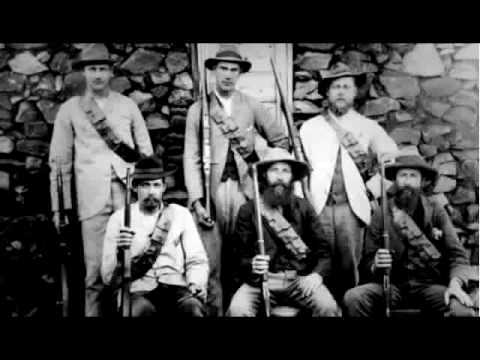
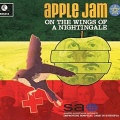
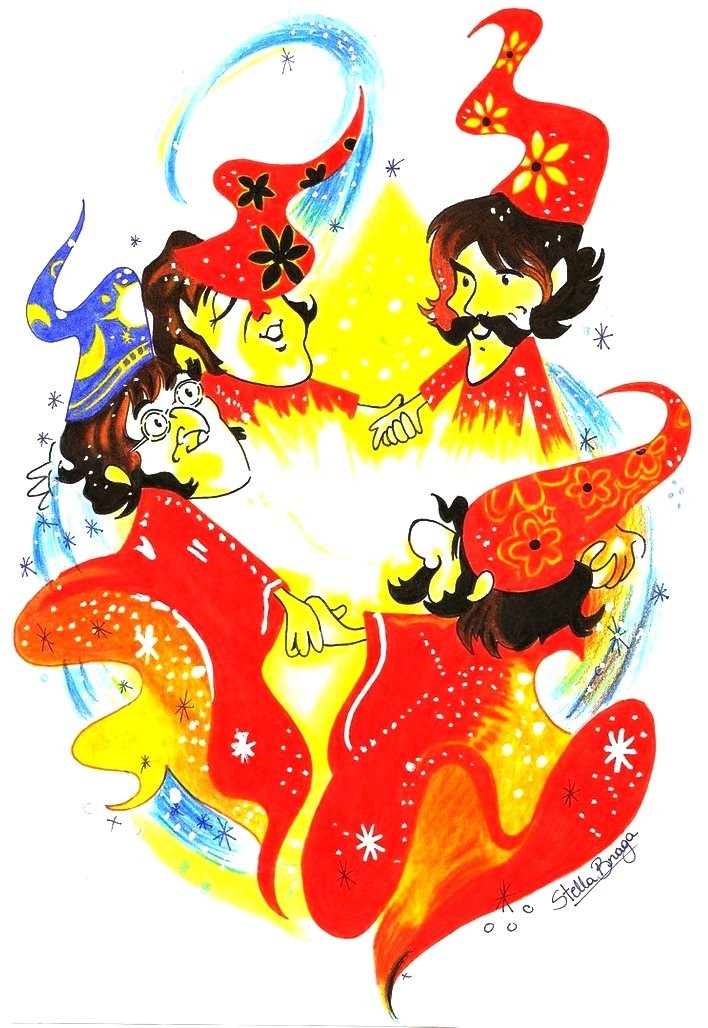
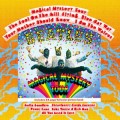

Amazing documentary… loved seeing Barry Miles, Neil Innes and other footage from the time. Just cracking.
Really good points about the Britishness of MMT, Michael. I remember watching “Monty Python’s Flying Circus” on my local PBS station as a child and expecting a literal Barnum & Bailey style circus. Instead, I encountered something far odder and world-expanding.
I’ve been rewatching the old “Python” episodes, which are still great, still revealing twists and turns and fillips that make them a delight. Just like Beatles songs. Part of what I love about the Pythons (and the Beatles, in some of their moods) is a deft daffiness that has real force and point. So “Argument Clinic” is hilarious, but also suggests something about the kind of anger that can lurk beneath a quiet, everyday surface. Beatleswise, “Paperback Writer” is funny but also rather sad (“I need a break!”). And “I’m a Loser” is self-pitying and angry but also pretty funny.
Anyway, there does seem something uniquely British about the way all these elements come together.
@kingkevin, next week I’ll be heading to UCLA to paw through old copies of the International Times!
@Nancy
“anger that can lurk beneath a quiet, everyday surface”
It’s too much, and too easy, to say that is the driver behind all comedy, but it was certainly a huge component of the British comedy from Fringe to 1980. A mutual friend once told me that Peter Cook was “the angriest person he’d ever met”–something that could’ve been leveled at pre-acid Lennon. Not for nothing were those two guys such pals.
Cleese–another Cook-acolyte–has written at length about the post-fame psychiatric journey he undertook to become a functional person, and much of the endless psychoanalyzing I do of JL on this site comes from wishing he’d done what Cleese did. That takes real guts.
I really enjoyed this documentary, too. It made for perfect viewing in advance of MMT.
FYI, I pre-ordered the deluxe set of MMT and, while it will make me sound 12 to say this: It’s awesome! But what’s especially nice is the book, which features a nice essay written by Barry Miles. I hadn’t heard much about Paul and Barry Miles still being friends so it was nice to see Barry involved in this project.
One thing I learned from the documentary and the movie: I had always heard people describe MMT as only Paul’s project — as if Brian Epstein didn’t approve it, wasn’t part of it. I’ve even heard people say Brian would “never have let that mess happen.” But in fact, Brian did approve the project. And two of the songs — the title track and Hello Goodbye — were recorded before Brian died. And I think it was the book, and Barry Miles’ essay, that mentions that those two tracks are the only optimistic type of songs, and that all of the songs recorded for MMT after Brian’s death were much darker, not at all optimistic, uncertain, and just sad.
Anyway, the deluxe set includes the 2 original vinyl EP’s faithfully reproduced. Did I mention the set is awesome? 🙂
— Drew
Drew, I thought the part describing BE’s relationship to the project was interesting, too. What I think Brian would’ve done was help translate MMT into something more polished, and/or put it into proper context. As created, MMT could’ve become the first midnight movie; or it could’ve become something more mainstream for the BBC. And once Brian had set the venue, The Beatles would’ve done what they always did, what they’ve done better than anybody ever–entertained an audience. MMT’s problem is that it was a movie for heads airing on a channel and timeslot for straights.
It’s like the cover of Sgt. Pepper (which BE famously did not like); the brilliance was getting the right people to support/package The Beatles’ idea in the right way. But where Sgt Pepper drew on Robert Fraser to art-direct the sleeve, and Michael Cooper/Peter Blake to create it, MMT had no such experts behind it.
Brian consistently put The Beatles in a position to succeed; he had an unerring sense of the right kinds of occasions, which then the guys would rise to (Royal Command, Sullivan, A Hard Day’s Night, All You Need Is Love). Once it was settled that they would do something, Brian surrounded them with quality people, and their radiance was multiplied. The right person makes all the difference; Heinz Edelmann for Yellow Submarine, for example.
I am a big fan of Neil Innes.
He is converging with Nikita Khrushchev (see 15:50 in the MMT documentary) and this link:
http://www.google.com/imgres?um=1&hl=en&safe=off&client=safari&sa=N&rls=en&biw=1350&bih=787&tbm=isch&tbnid=1yK9_Qr-VJ01vM:&imgrefurl=http://todayinhistory.tumblr.com/post/20001518762/march-27th-1958-nikita-khrushchev-becomes-premier&docid=cLKu3SfHD3_31M&imgurl=http://24.media.tumblr.com/tumblr_m1ic18tpYD1r65o3qo1_500.jpg&w=500&h=332&ei=2CeEUMqcK4K89QT42ICICw&zoom=1&iact=hc&vpx=1035&vpy=469&dur=1082&hovh=183&hovw=276&tx=151&ty=113&sig=105506254790809852062&page=1&tbnh=149&tbnw=197&start=0&ndsp=33&ved=1t:429,r:4,s:20,i:215
Ok, take it easy on me…but where is the link to the doc? I can’t fiiind it. Any help guys?
Thank youuu
CMO#9, you can just click on the film at the end of the post, but I’ve now also put in a link in the first sentence. Enjoy.
Haha. I knew it’d be right in front of my eyes! Thanks Mike.
Well said, Michael.
I read a biography of Dorothy Parker some years ago, and in her later years her favorite tv show was “This Is The Week That Was.”
– Hologram Sam
[…] Wickman seems weirdly hedgy in this review of Magical Mystery Tour Revisited, as if he’s reviewing something he doesn’t really want to talk about, or doesn’t […]